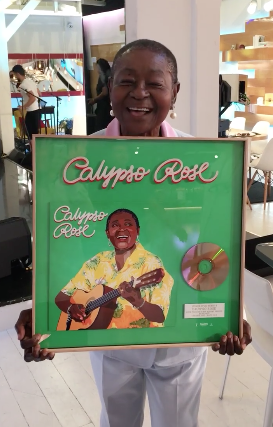Calypso Rose, once Rose McCartha Linda Sandy Lewis, is 77. She has seen and heard a lot, lived through times in Trinidad that were good and, well, bad. Her remarkable life has been one of triumph in a once thoroughly male world. But after more than 60 years of writing and performing Calypso, a Trinidadian music genre rooted in West African rhythms, perhaps the even greater feats are how relevant she has remained, and how much more of her we still want. Explore Parts Unknown contributor Anu Lakhan was fortunate enough to interview Calypso Rose by email.
Anu Lakhan: The fact that you were performing in a male-dominated art form has been much discussed. You were also very young, 16 or 17. What was that part of the experience like?
Calypso Rose: It was a good experience, actually. I was respected from early and kept to myself.
Lakhan: You were the first woman to have the most played song along the Road March [the Carnival parade route]. Still, after your 1977 win, it was 1999 before another woman won it. What’s your take on that astounding gap?
Calypso Rose: Women have to be braver and more confident in themselves and their ability. It takes courage to step out and make a mark and sustain it.
Lakhan: A lot of your work seems to have escaped our radar. Does it matter that Trinidad and Tobago may not have an idea of how much you’ve done and achieved?

Calypso Rose: It’s not that important—I am loved all over the world. In Belize they make me feel at home. I am an honorary ambassador for Liberia in the U.S. People all over the world sing and dance to the music. In France they call me the Queen of France! The audiences are people of all generations. It’s a global movement started in Trinidad and Tobago and taken to the rest of the world.
Lakhan: And you did it all without showgirl costumes or embracing the ingrained idea of women needing to add sex and sensuality to their personas. Has that worked for or against you? Both?
Calypso Rose: It has worked in the long term. If you base your career on sex and sensuality, it doesn’t work at 77 years young!
Lakhan: You started off with Baptist influences and are still a practicing Spiritual Baptist. African rhythms have grown in popularity, and that sound seems to have played a big part in your resurgence. Is there circularity at work here or just a train you never disembarked?
Calypso Rose: Africa is very important in my life and my craft, my religion as well. My father was a Spiritual Baptist pastor, my great-grandmother was from Guinea, and I remember her and her stories. And of course calypso music comes from the African rhythms of the drum. Those influences are all natural to me and will always be part of my music.
Lakhan: You recently worked with Machel Montano, an icon of soca. Soca is in many ways calypso’s rather wild and hyper child. Why were you interested in working with him?
Calypso Rose: Machel is my son. I love that boy dearly and have followed his career since he was small. I am close to his mother as well. It was very natural for us to collaborate. We had collaborated before and have always had a very close relationship.
Lakhan: You’ve written as many as 800 songs. Is there one song by someone else, from any genre, you wish you’d written?
Calypso Rose: “By the Rivers of Babylon” by Bob Marley. This song reminds me of the services that my Spiritual Baptist father would lead in the church in L’Anse Fourmi in Tobago every Sunday. He opened with this song.
Lakhan: It’s common practice to ask for a message for the young people of this time. Let’s flip that: Do you have a message for the elders of our time? Anyone from nation leaders to artists to just about anyone who thinks it’s time to retire.
Calypso Rose: To the elders, you are here until the good Lord calls you, so make the most of it and do whatever you want (but no crime!). Don’t let your body or age hold you back.
Listen to Calypso Rose’s music here. Follow her on Facebook and Instagram.